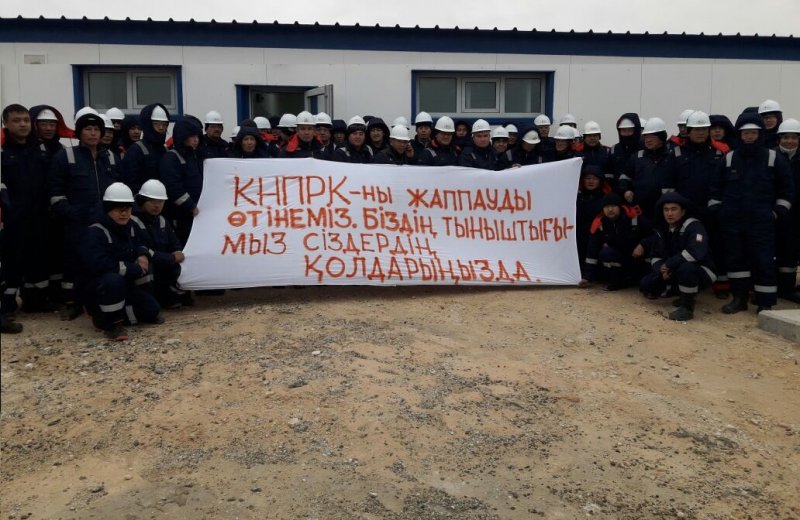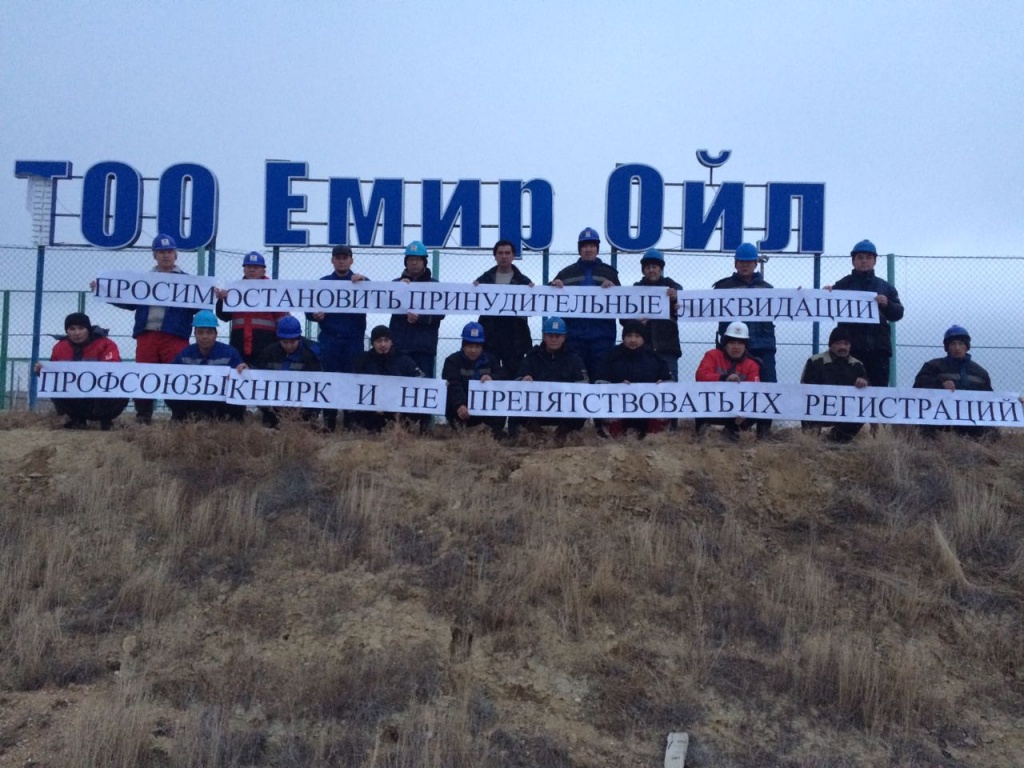Countries
Solidarity campaigns
Kazakhstan: state threat to shut down independent trade unions

Kazakhstan’s main independent trade union confederation is fighting for its life, as a court reviews a “justice” ministry bid to have it shut down.
The legal onslaught on union organisation comes after a four-year drive against opposition political parties and independent media. Nevertheless,
Workers at Emir Oil, Kazakhstan, display a banner protesting

at the legal attack on independent trade unions. Photo by KNPRK
the workers’ movement is not beaten: strikes, even where organised outside the law, are forcing employers and state authorities alike to back off.
The Justice Ministry’s case against the Confederation of Independent Trade Unions of Kazakhstan (KNPRK) opened in Shymkent, in the south of the country, on 5 December.
The ministry is also urging the liquidation of industrial affiliate organisations representing mine workers, medical staff and domestic workers. The KNPRK (formerly the Confederation of Free Trade Unions of Kazakhstan, KSPK) is the largest grouping of industrial and local union organisations outside the “yellow” state-linked Federation of Trade Unions of Kazakhstan (FPRK).
In October it affiliated to the International Trade Union Confederation, which has joined a worldwide protest campaign against the repression. A recent report by Human Rights Watch also helps, explaining the government’s attempt to strangle union organisation in detail. If you want to protest, you could sign the petition launched by LabourStart.
The Justice Ministry’s case has been brought under the 2014 trade union law, which imposes requirements for registration that are almost impossible to meet. Before the law was introduced, Kazakhstan had 896 trade union organisations, but only 163 survived the registration procedure, the independent web site Fergana.ru reported.
Larisa Kharkova, president of the KNPRK, told Fergana that the Justice Ministry had refused to register the confederation’s regional branches, without which the national organisation is in a legal no-man’s-land. The union had been refused registration 25 times in the last 18 months, she said:
Nurbek Kushakbaev, president of the KNPRK-affiliated Industrial Union of Workers in the Fuel-Energy Complex in Mangistau region in western Kazakhstan, where most of the oil and gas industry is based, described the spider’s web of bureaucratic tricks used to prevent organisations from registering. He told Fergana:We are up against a terrible situation: the closure of trade unions by the state. First the repressive trade union law was passed, which breached our rights and all the international conventions. The law required all trade unions to re-register [with the justice ministry], revise its rules and statutes and in a six-month period affiliate to an industrial or national structure. We did all of that. But then the ministry of justice, instead of registering our affiliates, started issuing writs for the cancellation of state registration.
Officials of the state-linked FPRK actively finger genuine union activists, Kushakbaev said. He gave the example of Kairakbai Zhanabekov, head of the FPRK’s Mangistau organisation, who wrote to the district prosecutor,In our region it’s the affiliates of the KNPRK that are prevented from registering. When they find out that a local organisation has been opened with our help and in the future could become a member organisation, they find any reasons or excuses not to register it. A simple answer: they take one document out of the packet [of documents to be submitted], and say that it is missing. Sometimes they argue about the grammar [used when the forms are filled in]. Probably they have been instructed [by the authorities] not to register us, and they are just obeying orders.
Workers at Kazstroiservis during their successful protest action. Photo by KNPRK
calling for a case to be brought against two militants of the independent union “Aktau”, Mukhtar Ubetov and Kenzhegali Suyeyuov. His complaint was that they “support strikes, rallies and hunger strikes by oil workers” and work in non-registered organisations.
The government clampdown on unions smacks of desperation. The price of oil, exports of which are a huge chunk of Kazakhstan’s wealth, is down; the economy in recession; and, despite the measures against unions, strikes flare up quite often in the oil industry and elsewhere.
On 5 October, Burgylau, a drilling contractor that works for the national oil company Kazmunaigaz, caved in to workers’ demands after a six-day strike by 2300 of its employees. It was the latest round of industrial conflict in Zhanaozen, the oil town in Mangistau where in 2011 a police massacre of strikers ended with at least 16 dead and 60 injured.
The Burgylau workers had demanded, first, that the company switch to a salary calculation system used by Kazmunaigaz, which they reckoned would raise their take-home pay, and, second, the reinstatement of their shop-floor union representative Sadaukas (“Saken”) Bekkaliyev, who had been sacked after a campaign of intimidation against him.
Burgylau agreed to support Bekkaliyev in an appeal against a conviction for theft of company property that had led to his dismissal, paving the way for his reinstatement.
It was the second time Bekkaliyev had been sacked. He told EurasiaNet.org that the workers wanted assurances that “our constitutional rights will be defended, that public organisations and trade unions will be able to work, and that no-one will hinder them”.
Burgylau has been hit hard by the fall in oil prices, which has led to well-drilling being slowed. The drilling rate dropped by 40% last year and will fall another 50%, deputy energy minister Aset Magauov has been quoted as saying. An earlier strike, in July, against cuts in pay rates and hours of work, had been supported by several hundred of the workers, Fergana.ru reported.
Workers at Kazstroiservis, an oilfield service company, at Fort Shevchenko in western Kazakhstan, also forced management to back down after a two-day action on 19-20 November. The workers, organised in the local trade union “Tupkaragan”, went on hunger strike at their workplace – and then demonstrated silently in the town square after their shift.
Kazakhstan has been shaken by social movements outside the workplace, too, this year. In May demonstrations erupted against changes to the land ownership laws, bringing tens of thousands of people on to the streets. Last month the regime took its revenge on two activists, Maks Bokaev and Talgat Ayan, who were jailed for five years each for “inciting social discord” and other political offences.
On Friday, the Kazakh workers’ movement will mark the fifth anniversary of the notorious police shootings of oil workers at Zhanaozen.
Last weekend, a commemoration meal to honour the victims was held at Tenge, near Zhanaozen. Relatives of those killed attended, and a camel and
At the commemoration of the Zhanaozen killings at Tenge last weekend. Photo by Sania Toyken
three sheep were slaughtered in accordance with custom, Sania Toyken reported on Radio Azattyk.
Shabdol Otkelov, one of the workers who served a jail sentence after the Zhanaozen strike, said: “People bring donations with them, whatever they can afford. We divide the money between the families of our fallen brothers.”
Nuriash Abdraimova, a community activist, addressed the gathering and urged support for Maks Bokaev and Talgat Ayan. “I came here from Turkmenistan, from Beshtash, and I know more than anyone what a homeland is”, she said. “Two Dzhigits [literally, horsemen, used to mean “hotheads” or “troublemakers”] who fought to defend the land, left to us by our forefathers, are in jail. Let us speak out in their defence, to the president, the general prosecutor and the Supreme Court.”
■ Details about how to protest against the jailing of Maks Bokaev and Talgat Ayan here.
■ Independent union confederation web site (Russian only).
■ Kazakh oil workers’ information on People & Nature.
Source: People and Nature


